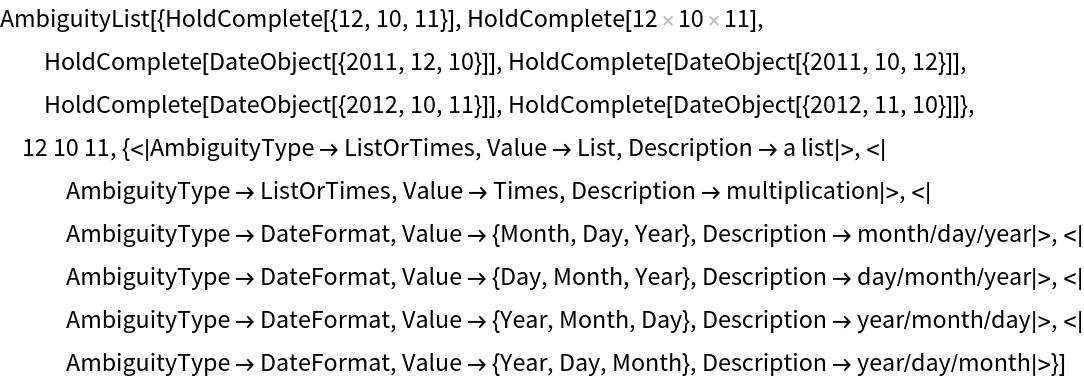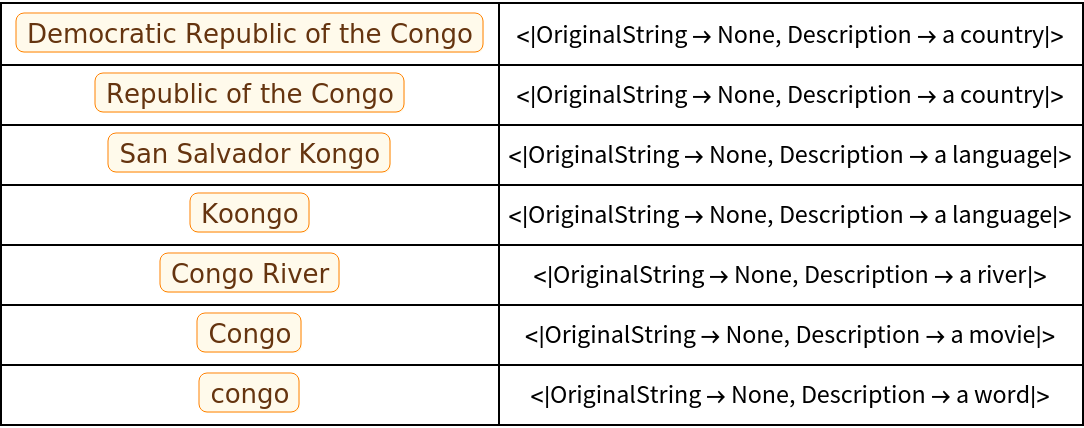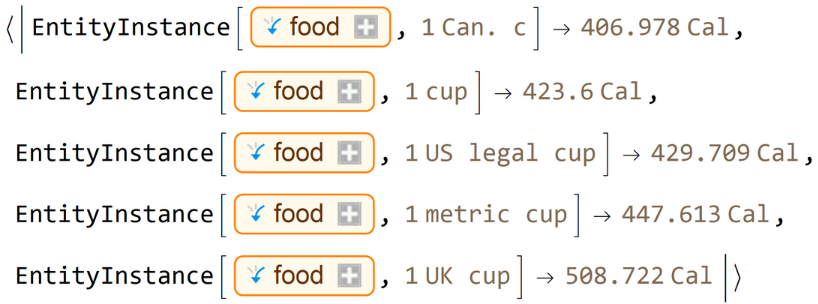Wolfram Function Repository
Instant-use add-on functions for the Wolfram Language
Function Repository Resource:
Restructure an expression with nested AmbiguityList expressions into a single flat AmbiguityList
ResourceFunction["FlattenAmbiguityList"][expr] restructures expr as a single AmbiguityList. | |
ResourceFunction["FlattenAmbiguityList"][expr, n] limits to no more than n possibilities. | |
ResourceFunction["FlattenAmbiguityList"][expr, n, crit] limits to no more than n possibilities pi for which crit[pi] is True. |
AmbiguityList is often only wrapped around the ambiguous part of an expression:
| In[1]:= |
|
| Out[1]= |
|
By moving the arguments inside the listed functions, all possible values can be computed directly:
| In[2]:= |
|
| Out[2]= |
|
Interpreter can return nested AmbiguityList expressions that may be difficult to reason about:
| In[3]:= |
|
| Out[3]= |

|
Flatten the expression to see all possibilities in a single flat list:
| In[4]:= |
|
| Out[4]= |

|
Ambiguous expressions can produce a large number of possibilities:
| In[5]:= |
|
| Out[5]= |

|
| In[6]:= |
|
| Out[6]= |
|
Limit the number of distinct possibilities produced:
| In[7]:= |
|
| Out[7]= |

|
Also limit to possibilities that pass a selection function:
| In[8]:= |
|
| Out[8]= |

|
By default, only preexisting metadata is maintained during restructuring:
| In[9]:= |
![congo = ResourceFunction["FlattenAmbiguityList"][
AmbiguityList[{Entity["Country", "DemocraticRepublicCongo"], Entity["Country", "RepublicCongo"], Entity["Language", "KongoSanSalvador::9rdzh"], Entity["Language", "Koongo::9wqpj"], Entity["River", "Congo::zqkh9"], Entity["Movie", "Congo::mf7gc"], Entity["Word", "congo"]}]
]](https://www.wolframcloud.com/obj/resourcesystem/images/4f0/4f0164b5-bdbf-46af-b1de-3ab6d63b4ab1/438cc2cac3284166.png)
|
| Out[9]= |

|
Add an entity type to descriptions for further clarity:
| In[10]:= |
|
| Out[10]= |

|
Show metadata alongside possibilities:
| In[11]:= |
|
| Out[11]= |

|
Find all interpretations for a food using an ambiguous unit of "cup":
| In[12]:= |
|
| Out[12]= |

|
Flatten the expression to see each interpretation:
| In[13]:= |
|
| Out[13]= |

|
Compare calorie amounts for different interpretations of the unit:
| In[14]:= |
|
| Out[14]= |

|
Unambiguous expressions are not restructured:
| In[15]:= |
|
| Out[15]= |
|
An already-flat AmbiguityList is not restructured:
| In[16]:= |
![ResourceFunction["FlattenAmbiguityList"][#] === # &[
AmbiguityList[{Entity["Country", "DemocraticRepublicCongo"], Entity["Country", "RepublicCongo"], Entity["River", "Congo::zqkh9"], Entity["Movie", "Congo::mf7gc"], Entity["Language", "KongoSanSalvador::9rdzh"], Entity["Language", "Koongo::9wqpj"], Entity["Word", "congo"]}]]](https://www.wolframcloud.com/obj/resourcesystem/images/4f0/4f0164b5-bdbf-46af-b1de-3ab6d63b4ab1/205f146938181df3.png)
|
| Out[16]= |
|
Expressions containing AmbiguityList in deeper parts of an expression will be moved to the top level:
| In[17]:= |
![ResourceFunction[
"FlattenAmbiguityList"][{123, AmbiguityList[{Entity[
"City", {"Springfield", "Illinois", "UnitedStates"}], Entity["City", {"Springfield", "Missouri", "UnitedStates"}]}, "springfield"]}]](https://www.wolframcloud.com/obj/resourcesystem/images/4f0/4f0164b5-bdbf-46af-b1de-3ab6d63b4ab1/3b69b0db37a87bf9.png)
|
| Out[17]= |
|
If ambiguity is present, a selection function that produces no matches returns an empty AmbiguityList:
| In[18]:= |
![ResourceFunction["FlattenAmbiguityList"][
AmbiguityList[{{AmbiguityList[{"a1", "a2", "a3"}, "A"], AmbiguityList[{"b1", "b2", "b3"}, "B"]}}], All, FreeQ[_String]]](https://www.wolframcloud.com/obj/resourcesystem/images/4f0/4f0164b5-bdbf-46af-b1de-3ab6d63b4ab1/564e5e7964a5369d.png)
|
| Out[18]= |
|
When no ambiguity is present, the expression is left untouched:
| In[19]:= |
|
| Out[19]= |
|
Sometimes ambiguous expressions can produce a large number of possibilities, which can take excessive memory and computation time:
| In[20]:= |
![MemoryConstrained[
Length@First@
ResourceFunction["FlattenAmbiguityList"][
SemanticInterpretation["springfield, boston", AmbiguityFunction -> All]],
100*10^6
]](https://www.wolframcloud.com/obj/resourcesystem/images/4f0/4f0164b5-bdbf-46af-b1de-3ab6d63b4ab1/1f1fb6720bd14244.png)
|
| Out[21]= |
|
This work is licensed under a Creative Commons Attribution 4.0 International License